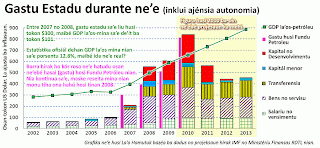Public comments were due 5 November. LH's comment.
In the five years since it was unanimously enacted by Parliament, Timor-Leste's Petroleum Fund Law has served the nation well. We have accumulated more than $6.6 billion dollars in the fund, which has provided a model for other oil-export-dependent countries of responsible and safe revenue management. Our conservative investment strategy made Timor-Leste's Petroleum Fund the only Sovereign Wealth Fund in the world not to lose money during the 2008 global financial crisis, even though the return on investment has been less than many had hoped. The Law's guideline of spending no more than 3% of the nation's total petroleum wealth in a single year has supported consideration of long-term fiscal sustainability (even though the Government overspent the rule in 2009 and 2010). The prohibition of the use of the Fund as collateral for loans has helped to encourage fiscal responsibility, a counterweight to pressures to spend large amounts of money quickly.
Timor-Leste's Petroleum Fund pays for 95% of state activities, including provision for many people's basic needs. Without oil and gas revenue our state would be bankrupt and our people would be hungry. Poverty will increase, and we will not be able to use our non-renewable petroleum birthright to build a non-oil economy which can function after the oil and gas runs out in less than a generation.
Imminent revisions to the Petroleum Fund law endanger the security it has provided since 2005. Risky investments could lead us down Nauru's path from wealth to poverty. Spending beyond sustainable levels will impoverish our grandchildren, especially in light of our growing population and high rate of inflation.
Since last year, the Ministry of Finance has been preparing to revise the Petroleum Fund law, hiring consultants, drafting papers, and holding private and public meetings. The pace has increased during the last two months, with the goal of passing revisions through Parliament by the first quarter of next year. La'o Hamutuk believes it is important for every citizen to have a chance to give informed input to decisions that will impact their lives for the indefinite future.
In early September, the Fund's Investment Advisory Board released a Statement of Investment Beliefs and Principles which encourages diversification into equities (stocks) as well as bonds, using external managers.
During the past three weeks, the Council of Ministers has had several discussions on diversifying current investments (90% in government bonds, up to 10% in traded stocks) to include more stocks, as well as real estate, infrastructure, and other instruments. Given the attempt to scam the Fund of a billion dollars last year, caution is required. Although everyone wants the Fund's investments to earn a higher return, wishing doesn't make it so. Risking the Fund's principal in the hopes of high profits will endanger the future of our children, and a state which faces the voters every five years may not be able to carry out a long-term investment strategy, with gains and losses to the invested principal.
The Council of Ministers has considered other revisions to the law, including weakening the justification required for spending unsustainably, and the Ministry of Finance circulated draft amendments to the law (also Portuguese) at a "mini-seminar" on 23 October, asking for comments by 5 November. The draft amendments allow up to 50% of the Fund to be invested in equities (stocks), including up to 5% in "alternative" investments like real estate, infrastructure or private equities. A summary of La'o Hamutuk's submission is available here, and the full text is here.
On 18 October , the Ministry of Finance announced the appointment of Schroders Investment Management Ltd. to manage $260 million of the Petroleum Fund, which they will invest in stock, using the flexibility in the current law.
La'o Hamutuk hopes that there will be a serious discussion of these proposed changes, which will include many perspectives on their benefits, drawbacks, implications and risks.
- Submission from LH to Ministry of Finance 5 November
- Comparison of current and proposed laws
- Draft amendment law from Ministry of Finance 23 October (also Portuguese)
- Text of existing Petroleum Fund Law (English, also Portuguese)
- Information on the Petroleum Fund (English/Tetum)
- Information on revising the Petroleum Fund Law. English or Tetum
- Information on borrowing. English or Tetum
- Information on the 2011 State Budget and basic economic situation. English or Tetum


















